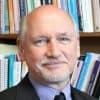The bishop of El Paso, Texas, and chairman of the Committee on Migration for the U.S. Catholic bishops conference, reflects on mission and migration.
Bishop Mark J. Seitz of El Paso, Texas, credits a Maryknoll priest from his hometown in Wisconsin as one of the inspirations for his priestly vocation, along with the Maryknoll magazine at his grandparents’ home that he would look at before he could even read.
Bishop Seitz ordained two new priests for the Maryknoll Fathers and Brothers in June. In an interview afterward, he denounced the Trump administration’s indiscriminate roundup of immigrants in the United States — including not only the undocumented but also visa holders, vetted asylum seekers and permanent residents — and the suffering it is causing them and their families.
“I never thought our country could show such a hardened heart to people who were simply seeking a place of refuge,” said Bishop Seitz, who is chairman of the Committee on Migration for the United States Conference of Catholic Bishops. “And that somehow even though we would consider ourselves Christian, we could watch the suffering that we’re causing without remorse.”
The bishop said that immigrants to the States “have always had a tough road” despite our history as a country of immigrants. He recalled the words of the poem at the base of the Statue of Liberty welcoming the “huddled masses yearning to breathe free” and called immigration a source of national pride.
Sadly, he said, our country has at times failed to rise to that aspiration. Each successive wave of immigrants has faced prejudice and rejection.
“But I really didn’t believe we would regress to the point in which immigrants would be seen as not worthy of human dignity, not worthy of our concern or our love,” he said.
“In my worst nightmare I wouldn’t have thought that we would find ourselves in a place we are right now,” he said, when “a whole group that simply had the bad fortune of being born in a place where they could no longer live, would be treated as though they were criminals.”
He said the country has adopted a “false narrative” casting all immigrants as criminals, when numerous studies have shown that immigrant communities are safer and have lower crime rates than do native-born communities.
As a young man considering the priesthood, Bishop Seitz said, he felt drawn to joining a missionary order. But as a student at the University of Dallas, where he earned a bachelor’s and two master’s degrees, he fell in love with the Latino culture of Texas, then receiving a large influx of migrants from Mexico in the early to mid-1970s.
“I never lost the love of mission,” he said. Ordained to the Diocese of Dallas in 1980, he was asked by his bishop to initiate the first Spanish Mass at Good Shepherd parish in Garland, Texas. This prompted him to learn Spanish. Later, as a pastor at various churches, he went on to develop sister parishes in Mexico and Honduras.
“That really had a tremendous impact on my outlook and my joy of the missions that I’ve done,” he said.
“Ninety nine percent of immigrants are good, deeply faithful people who simply want to provide a safe place for their children and a place where they could provide for their basic needs and to make the country that they’ve adopted a better country,” he said.
“I’ve met them, so I’m not speaking from ignorance,” he said, noting the thousands of people he has served firsthand. “I’ve worked with them.”
The city of El Paso, where he has served since 2013, has also been “smeared with the false narratives,” he said, calling the border city “a dynamic place of encounter,” where many people live on one side of the border and work on the other.
“There’s a dynamism there that makes it a very creative and fruitful kind of environment with a great joy in welcoming people,” Bishop Seitz said. “We don’t fear immigrants. We look at them as brothers or sisters.”
In recent years, however, government policies and the militarization of the border have made cross-border collaboration more difficult, he said.
“If you want to call the level of immigration a crisis, then call it a humanitarian crisis,” he said. “Because there’s a crisis that is forcing people out of their homes.”
The Catholic Church does not propose removing vetting of those who wish to cross, but rather reforming immigration policies and practices. “We believe that there should be an orderly process, both for crossing for economic reasons, and in search of asylum,” he said.
He noted that the United States birth rate is not sufficient to reproduce the population to sustain a healthy economy, and the country needs immigrants to fill entry-level jobs.
“Don’t see immigrants as the crisis, and don’t see them as though they are somehow a threat,” he said. “Because in fact, they are the best hope of our nation and always have been.”
Featured Image: In an interview held at the Maryknoll Fathers and Brothers headquarters in Ossining, New York, on June 7, 2025, Bishop Mark J. Seitz of El Paso, Texas, spoke about migration. (Michael Meyerson/U.S.)
See more of our interview with Bishop Seitz below:

